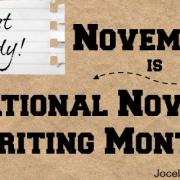[[{"type":"media", "view_mode":"media_large", "fid":"679", "attributes":{"class":"media-image alignright", "typeof":"foaf:Image", "style":"", "width":"193", "height":"300", "alt":"WeddedtoWarcover-193x300"}}]]by Jocelyn Green I should have known better. But when the local reporter came to interview me about my newly released novel, Wedded to War, I told her that my kids, ages 3 and 6, would be home with us, but that they “knew how to stay quiet.” Can you guess how that interview went? Let’s just say that by the end of it, the reporter shifted her line of questioning from the Civil War inspiration to: “This is your fifth book since I was here last time. How do you write with two little kids running around?” Great question! I’m practically starved for writing time most of the year, and if you have a family or a job or some desire to do anything other than write, I know you can relate. I do have one writer friend who, when a book deadline approaches, packs up and heads to her cabin in the mountains for weeks at a time to just get ‘er done. How nice for her. But since we can’t all have the cabins of our dreams, and the time to use them, what’s a writer to do? The only answer is to maximize the time that we do have. Here are ten tips I’ve picked up over the past several years. 1) Write without editing yourself. (Yet.) I was an editor before I wrote any books. But when I let my editor’s brain take over my writer’s brain, I played a mental tug-of-war on the page, rewriting a scene (or even—dare I say it?—a single paragraph) several times and not making any actual progress on the word count in a given day. Since then I learned that we write with one side of our brain, and we edit with the other side. So don’t try to do both at once. Just write the thing first. You can edit later. In Bird by Bird, Anne Lamott says:
“Almost all good writing begins with terrible first efforts. You need to start somewhere. Start by getting something—anything—down on paper. A friend of mine says that the first draft is the down draft—you just get it down. The second draft is the up draft—you fix it up. You try to say what you have to say more accurately. And the third draft is the dental draft, where you check every tooth, to see if it’s loose or cramped or decayed, or even, God help us, healthy.”
I have gone through more than three drafts, I’m sure, but that’s beside the point. The point is—get it down. Editing slows the process in the initial stage. 2) Don’t do the laundry. At least, not during your writing time. Writing from home, it’s so tempting to “just throw in one load.” But if you put a load in the washer, you’ll probably want to put it into the dryer. And if you put it in the dryer, chances are, you’ll want to fold the clothes before they wrinkle. The interruptions pile up faster than the laundry. The same concept goes for washing the dishes, dusting, etc. It might seem like just a few quick minutes to straighten up, but if it’s taking away from your writing time—and more importantly, from your focus—it’s not allowed. I read somewhere that after every interruption, it takes about 20 minutes to get fully back into the groove of your previous momentum. I can’t cite this source, and I’m not sure how they did this study, but it feels true enough, or close enough to the truth, for me to ruthlessly squelch the urge to do just a tiny chore during writing time. 3) Set goals. And make them just beyond what you think you can achieve. Whether you try to hit a word count or write a certain number of scenes per day, aim for something. If you’re at a loss in this area, the book 90 Days to Your Novel spells out all the daily goals for you. You can adjust the timeframe as you see fit. 4) Write “as the bullets fly.” I’m stealing this phrase from Pamela Redmond Satran in a recent article she wrote in a recent issue of Writer’s Digest. She shares how after she had a baby, she waited until the quiet moments of nap time or after bedtime to write, but it was never enough. Then, she had an epiphany. She says:
“Forget about waiting for the quiet moment alone in the pristine room: I was never going to get that again, at least not for a long time. And so rather than stealing writing time in my office, I moved my laptop to the living room. Instead of writing late at night or early in the morning before my child woke up, I started doing it while she was right there. I wrote while I watched the 802nd viewing of Cinderella. . . ”
And the pages added up. This is something I am learning to do right now. My “office” (aka laptop) now travels with me to the playroom, the family room, and the backyard. I use www.logmein.com to access the files and email on my desktop computer. 5) Be anti-social. When you’re up against a deadline, shut down your email, turn off Facebook, Twitter, etc. One writer I know deactivates her Facebook profile when she’s writing, and reactivates it once she’s done. If you really can’t go totally dark, tell yourself you will only do social media during one (or two) designated small slots of time a day. Being anti-social in real life helps, too. For weeks or months, I just have to say no to most of my social life. Pampered Chef party? I'll order online. Girls Night Out? I'm eating at my desk in my writing pants. Fantastic movie playing? I'll see it on Netflix later. (You get the idea.) One important exception-I make a point of deliberate one-on-one time with my husband, and of course some quality time with the kids. I can make all kinds of sacrifices in the name of deadline, but I do draw the line somewhere. 6) Write when you’re fresh. If you do your best writing in the morning, don’t whittle away that time responding to emails. Write first. The emails can usually wait. I used to tell myself I could write in the evenings, but I’m so exhausted by the end of the day, one hour in the morning is worth three hours at night! 7) Get up earlier. Hey, I’m not a morning person either, but I found that by getting up at 5am instead of when my kids get up at 7, I can double the amount of writing time I usually get in a day. Amazing! 8 ) Skip writer’s block. If you have trouble writing a certain scene, skip it and move on to something else you can get into. You can always go back to that trouble spot later and fill it in. Just keep writing. 9) Create time. What can you delegate to others to free up more writing time for yourself? Would it be worth it to have a maid service come in so you can use that time to write? Child care is always a dilemma when they are young. I hired a babysitter (make that seven babysitters—long story) last summer. This summer I am bribing them. If they are good in the morning, we go bowling or to the water park in the afternoon. I’m also trying to write as the bullets fly! If they are too young for this to work, you might want to find another mom and swap kids a couple times a week. The other relentless time-consuming issue is meal preparation. I don’t want to spend hours in the kitchen before and after we eat dinner, but I also don’t want to resort to fast food or take-out. So I make meals ahead of time and stock the freezer with them. Check out the book Don’t Panic! Dinner’s In the Freezer for plenty of recipes. When I run out of my own freezer meals, I'm not above Stauffers, Marie Calendar, etc. 10) Pray. This is the easiest thing to do, and so important. Before your fingers touch the keyboard, pray. Pray that God will give you focus, clarity, creativity, whatever it is you most need on that day. And ask others to join you! Many writers, myself included, have a prayer team supporting them throughout their writing project. Or just ask a few trusted friends for prayer on a more spontaneous basis. I cannot even count the number of times I have asked friends to pray, and then within days (sometimes within hours) that specific request was answered above and beyond my expectations and hopes. Stories are powerful. Jesus used them (parables) to communicate profound truths. Why not pray that God will help us tell the story He wants us to tell, the way He wants us to tell it, and that He would help us do it before our deadline? If he could feed the five thousand from two loaves of bread and five fish, He can help us make the most of our writing time. How do YOU make the most of your writing time?










